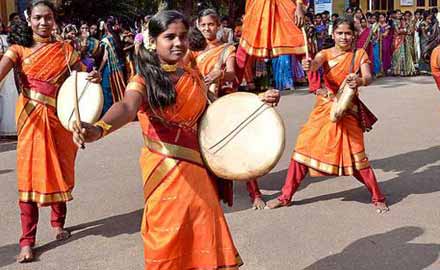
by P Avinash Reddy 1 April 2019
Traditional street performers predominantly belong to certain tribal communities and rely on knowledge that has been passed to them over centuries. It has become their way of life and is their sole source of livelihood. These individuals go through rigorous training from their early childhood days and start performing at a very nascent age. The streets in India were known to be bustling with various types of traditional street performers who would entertain the crowd with their skills and talents. It was one of the most engrossing sources of entertainment for the majority of the population. However, these performances have been criminalized under the provisions of numerous Anti-Beggary laws in India.
Section 2 (1)(i)(a) of The Bombay Prevention of Begging Act, 1959like 20 other Anti-Beggary Acts, provides that “Soliciting or receiving alms, in a public place whether or not under any pretense such as singing, dancing, fortune telling, performing or offering any article for sale” will be considered as begging.
By equating these performances to begging and decriminalizing these performances, Indian government has not only snatched away the only source of income that the traditional street performers relied on, it also has the effect of degrading these performances and in turn degraded the way of life of these performers. These legislations have in fact disregarded the existing cultural diversity in India and pushed the already marginalized communities to the fringes of the society. As their skills cannot be legally used to earn their livelihood, many of these community members have started taking up jobs such as rag-picking, construction labour etc. which have no relation to their skills or talents that they are trained in.
Judgment of Delhi High Court – A step towards alleviating the situation of traditional street performers
On a positive note, begging has been decriminalized in the National Capital Territory of Delhi after two Public Interest Litigations filed in the Delhi High Court challenged the provisions of The Bombay Prevention of Begging Act, 1959 as it was extended to the National Capital Territory of Delhi.
The petitioners as well as the court primarily relied on Article 21 of the Constitution of India which provides for the “Right to Life”. In India, the right to life has been understood to be encapsulating at least the right to food, clothing, decent environment and shelter. In the case of Bandhua Mukti Morcha v. Union of India, the Supreme Court of India laid down a comprehensive and inclusive definition for the right to live with human dignity as is extended under the Article 21. It covered the aspects relating to education, decent and humane conditions of work, protection of health etc. and the court in the current case emphasized on these aspects and observed that the Indian State has failed to provide even these basic essentials.
The fact that begging has been decriminalized in Delhi definitely provides some relief to the traditional street performers in Delhi but it is pertinent to emphasize that these performances should not even be equated with begging in the very first place.
Conclusion
Even if indirectly, this judgment upholds the rights of traditional street performers to perform in public spaces and seek money in return as it takes away the power of police authorities to arrest them without a warrant. Therefore, if not any positive action, the judgment at least effectively protects these performers from constant harassment and degrading treatment by the police in the national capital. The government should take a cue from this judgment and should at least make the distinction between traditional street performances and begging which can then lead to creating policies, support and regulatory mechanisms to encourage these performances.
Some traditional street performers have come together to set up ISPAT (Indian Street Performers’ Association Trust) in 2013 to revive the traditional street performances but it can only be beneficial to a certain extent as long as there are laws which criminalize these performances. It will also need to be coupled with positive action by the government authorities to recognize these performances and encourage them in both the urban and rural settings.
